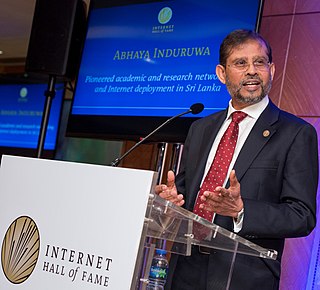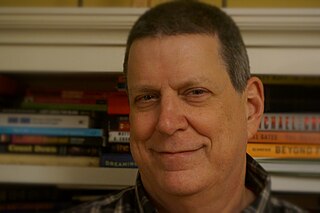Related Research Articles

Andrew Stuart Tanenbaum, sometimes referred to by the handle AST, is an American-born Dutch computer scientist and retired professor emeritus of computer science at the Vrije Universiteit Amsterdam in the Netherlands.

Ronald Linn Rivest is an American cryptographer and computer scientist whose work has spanned the fields of algorithms and combinatorics, cryptography, machine learning, and election integrity. He is an Institute Professor at the Massachusetts Institute of Technology (MIT), and a member of MIT's Department of Electrical Engineering and Computer Science and its Computer Science and Artificial Intelligence Laboratory.

Jack Joseph Dongarra is an American computer scientist and mathematician. He is a University Distinguished Professor Emeritus of Computer Science in the Electrical Engineering and Computer Science Department at the University of Tennessee. He holds the position of a Distinguished Research Staff member in the Computer Science and Mathematics Division at Oak Ridge National Laboratory, Turing Fellowship in the School of Mathematics at the University of Manchester, and is an adjunct professor and teacher in the Computer Science Department at Rice University. He served as a faculty fellow at the Texas A&M University Institute for Advanced Study (2014–2018). Dongarra is the founding director of the Innovative Computing Laboratory at the University of Tennessee. He was the recipient of the Turing Award in 2021.

University Visvesvaraya College of Engineering (UVCE) was established in 1917, under the name Government Engineering College, by Bharat Ratna Sir M. Visvesvaraya. It is the 5th engineering college to be established in the country and 1st in Karnataka. UVCE is one of the few technical institutions in the country that is vested with the status of a university and autonomy on the lines of IITs. It is one of the oldest technical institutions in the country, imparting technical education leading to B.Tech., B. Arch., M.Tech., M. Arch. and PhD degrees in the various disciplines of Engineering and Architecture. The college is approved by the AICTE and the Government of Karnataka. UVCE has secured an NAAC accreditation score of 3.75. UVCE, while a constituent college of Bangalore University until 2022, secured an NIRF ranking of 64. The college used to receive financial aid under the TEQIP program from the World Bank.

Eugene Howard Spafford, known as Spaf, is an American professor of computer science at Purdue University and a computer security expert.

The Centre for Development of Advanced Computing (C-DAC) is an Indian autonomous scientific society, operating under the Ministry of Electronics and Information Technology.

Willy Susilo is an Australian cybersecurity scientist and cryptographer. He is a Distinguished Professor at the School of Computing and Information Technology, Faculty of Engineering and Information Sciences University of Wollongong, Australia.
Mobile Cloud Computing (MCC) is the combination of cloud computing and mobile computing to bring rich computational resources to mobile users, network operators, as well as cloud computing providers. The ultimate goal of MCC is to enable execution of rich mobile applications on a plethora of mobile devices, with a rich user experience. MCC provides business opportunities for mobile network operators as well as cloud providers. More comprehensively, MCC can be defined as "a rich mobile computing technology that leverages unified elastic resources of varied clouds and network technologies toward unrestricted functionality, storage, and mobility to serve a multitude of mobile devices anywhere, anytime through the channel of Ethernet or Internet regardless of heterogeneous environments and platforms based on the pay-as-you-use principle."

Abhaya Induruwa is a Sri Lankan engineer and educator who is known for pioneering Computer Science & Engineering education in Sri Lanka. He founded LEARN Internet, the country's IP network for academic and research communities in Sri Lanka. He served as the inaugural Professor V K Samaranayake Endowed Professor of Computing, University of Colombo School of Computing, Sri Lanka. Having served as the Director of Cyber Innovation Hub he retired from the Canterbury Christ Church University in the United Kingdom where he researched into security and forensic investigation of Internet of Things (IoT) with a special interest in security vulnerabilities of smart home appliances. Currently he is engaged in promoting IoT in digital agriculture as a disruptive technology, primarily in developing countries, leading to smart agriculture resulting in higher yields in food production. Induruwa is considered the father of Internet in Sri Lanka.

Chai Keong Toh is a Singaporean computer scientist, engineer, industry director, former VP/CTO and university professor. He is currently a Senior Fellow at the University of California Berkeley, USA. He was formerly Assistant Chief Executive of Infocomm Development Authority (IDA) Singapore. He has performed research on wireless ad hoc networks, mobile computing, Internet Protocols, and multimedia for over two decades. Toh's current research is focused on Internet-of-Things (IoT), architectures, platforms, and applications behind the development of smart cities.

Albert Y. Zomaya is currently the Chair Professor of High Performance Computing & Networking and Australian Research Council Professorial Fellow in the School of Information Technologies, The University of Sydney. He is also the Director of the Centre for Distributed and High Performance Computing. He is currently the Editor in Chief of IEEE Transactions on Sustainable Computing and Springer's Scalable Computing and Communications. He was past Editor in Chief of the IEEE Transactions on Computers.

Albert Greenberg is an American software engineer and computer scientist who is notable for his contributions to the design of operating carrier and datacenter networks as well as to advances in computer networking and cloud computing. He currently serves as Vice President of Platform Engineering at Uber.
Claudio Silva is a Brazilian American computer scientist and data scientist. He is a professor of computer science and engineering at the New York University Tandon School of Engineering, the head of disciplines at the NYU Center for Urban Science and Progress (CUSP) and affiliate faculty member at NYU's Courant Institute of Mathematical Sciences. He co-developed the open-source data-exploration system VisTrails with his wife Juliana Freire and many other collaborators. He is a former chair of the executive committee for the IEEE Computer Society Technical Committee on Visualization and Graphics.
CloudSim is a framework for modeling and simulation of cloud computing infrastructures and services. Originally built primarily at the Cloud Computing and Distributed Systems (CLOUDS) Laboratory, the University of Melbourne, Australia, CloudSim has become one of the most popular open source cloud simulators in the research and academia. CloudSim is completely written in Java. The latest version of CloudSim is CloudSim v6.0.0-beta on GitHub. Cloudsim is suitable for implemeting simulations scenarios based on Infrastructure as a service as well as with latest version Platform as a service, so get started here

Vincenzo Piuri is an Italian scientist. He is an IEEE Fellow and an ACM Distinguished Scientist. He is known for his work in the field of information processing, with specific focus on artificial intelligence, computational intelligence, signal/image processing, biometrics, industrial applications, measurement systems, arithmetic units and fault-tolerant architectures.
Ivona Brandić is a Bosnian–Austrian computer scientist known for her research on cloud computing. She is University Professor for High Performance Computing Systems in the Institute of Information Systems Engineering of TU Wien.

Sanjay Raghuveer Chaudhary is an Indian writer, professor, and computer scientist from Gujarat, India. He is a professor of computer science at Ahmedabad University, Ahmedabad. He has authored several books in Gujarati and English. His literary work Girnar (2009) received Gujarat Sahitya Akademi's Best Book Prize in Essays and Travelogue category. He has published and edited several books on computer science. He is a senior member of Institute of Electrical and Electronics Engineers (IEEE).
Giancarlo Fortino is an Italian computer scientist who is currently a full professor of computer engineering at the Department of Informatics, Modeling, Electronics and Systems (DIMES) of the University of Calabria.

Venugopal Kuppanna Rajuk known as Venugopal K. R. (VKR) was born on 26 March 1956 in Bangalore. His father, Muniswamappa Kuppanna, a farmer worked in Indian Telephone Industries Bangalore, mother Narayanappa Muniyamma was a home maker. He was former Vice-Chancellor of Bangalore University, Principal of University Visvesvaraya College of Engineering (UVCE), He was also the chairman, Department of Electronics and Communication, Computer Science Engineering and Information Science Engineering in University Visvesvaraya College of Engineering (UVCE). He has served UVCE as well as Bangalore University for the last five decades. UVCE has been affiliated to Bangalore University since 1964. Dr. Venugopal K R was the Special Officer to the Government of Karnataka for Trifurcating Bangalore University. He submitted the report on 26 March 2015 for restructuring Bangalore University into Bangalore University, Bengaluru City University and Bengaluru North University and UVCE to be carved out as Center of Excellence on the model of Indian Institute of Technology. UVCE was granted autonomy by a bill tabled in Karnataka assembly and now UVCE is an autonomous institution with effect from 25 March 2022.
Sky computing is a paradigm that aims to develop cloud computing model further. It aims to combine existing clouds of different service providers into a comprehensive, interoperable sky. The concept behind sky computing is to create a cloud of clouds that behaves in a similar way to the internet, which consists of a network of networks. There is a limited number of credible sources supporting this assertion. As of 2024, this trend has not achieved widespread adoption, and therefore, its efficacy remains unproven.
References
- 1 2 "Scopus award winners for Australia and New Zealand announced". New Scientist . 17 November 2017. Archived from the original on 30 August 2022. Retrieved 30 August 2022.
- ↑ Morris-Reade, Ryan (16 February 2022). "University of Melbourne uses Oracle Cloud to harness the power of IoT". IT Brief Australia. Archived from the original on 30 August 2022. Retrieved 30 August 2022.
- ↑ "2015 newly elevated fellows" (PDF). IEEE Fellows Directory. Archived from the original (PDF) on 30 March 2015.
- ↑ "Buyya Rajkumar". Academy of Europe. Retrieved 15 January 2025.
- ↑ Rowbotham, Jill; Dodd, Tim (10 November 2021). "These 40 researchers are lifetime achievers in their fields". The Australian . Archived from the original on 30 August 2022. Retrieved 30 August 2022.